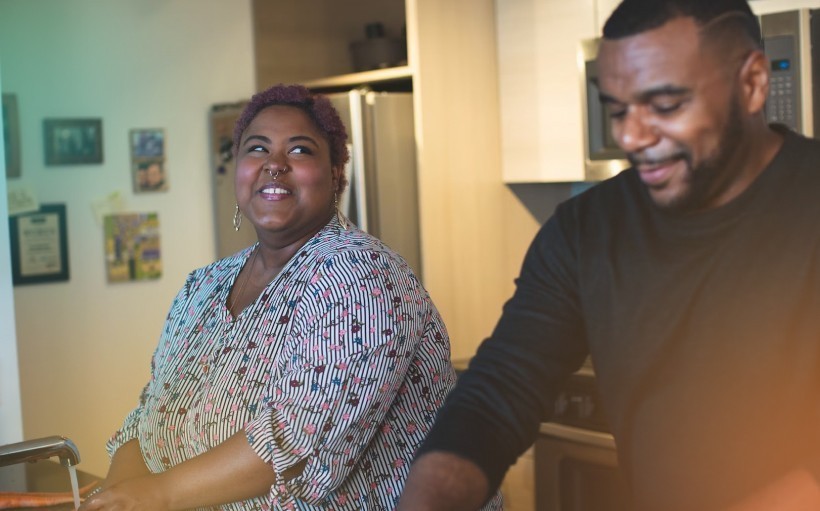After a devastating relationship breakup, I threw myself into the dating scene by registering on Hily. I had over 100 dates - some absolute disasters, some pretty average, and some that were actually great. So many stories to tell and insights to share with you guys!
Relationship Values to Share
You look at your friends and family members who enjoy long-lasting, healthy relationships and want the same thing for yourself. How do you achieve that? It can be frustrating when your relationship goals never seem to pan out. What is it that they have that you don’t? It isn’t hobbies or interests in common. As it turns out, there is nothing more important than shared values in a relationship. That is truly the key to happy, meaningful relationships that last. Let’s talk about it.

7 Values in a Relationship That Couples Should Share
What are the shared values that should be at the center of every romantic relationship? Do you and your partner need to be on the same page about everything to have a successful relationship? Not at all. People with different views and perspectives can have a lasting relationship. The important thing is that you have some shared core values that help to ensure a deeper emotional connection.
1. Mutual Respect
Mutual respect is the foundation of a healthy relationship. Couples may disagree. They get angry with one another and have clashing opinions. Sometimes, it can feel as if there is no common ground to be found. This is why mutual respect is so important.
When mutual respect is one of the guiding principles of a relationship, each partner agrees to certain standards of behavior no matter what else is happening. No matter the disagreement, they will treat the other person with a basic level of courtesy, dignity, and regard.
When people have respect for one another, they fight fairly:
- They don’t say cruel things in the heat of the moment
- They don’t ignore the other person’s needs
- They certainly don’t lie or mislead one another
Respect also means that you and your partner don’t criticize or denigrate one another in public.
2. Mutual Appreciation
As relationships become established, people often forget about the small courtesies that can make their significant other feel appreciated. Part of this is simply having good manners.
If a stranger in a store deserves a please or thank you, then the person you are building a family with does too.
But, appreciation goes beyond that. It is doing real things to show that you value their work and efforts:
- Ensure division of labor in your relationship is truly fair
- Plan fun dates and celebrations for them
- Give thoughtful gifts and compliments
- Be respectful of the things your partner values
- Show respect for their time and efforts
Partners grow closer to one another when they feel appreciated in meaningful ways.
3. Open Communication
“Commit to open and honest communication. Have a commitment to talk about anything that arises in real-time that causes separation and can help partners be vulnerable, share their thoughts and feelings.”
Nicole Doherty, women’s empowerment coach
Honest communication is the foundation of healthy long-term relationships. The lack thereof can quickly lead to strife and conflict.
Communication isn’t just one of the most important core values. It’s the thing that will get you on the same page with your partner when it comes to all of the other shared values.
It’s early in your relationship and you’re just excited to have this new person in your life. You don’t want to start conflicts, so you try not to be too opinionated. Maybe you even pretend to believe things that don’t align with who you are. Deep down, you know you aren’t being yourself, and you’re not showing your true values.
This can’t last, and you know it. Better to be yourself and present your values authentically. Yes, it may turn out that the one you are with just isn’t compatible. Wouldn’t you prefer to learn that now rather than after you develop deep feelings?
Good communication begins with trust. Then, you need compromise. Remember that the willingness to find common ground is what will bring you closer together – not a desire to win. In this case, honesty is the foundation of good communication. At the same time, telling the truth should be done with consideration for your partner’s feelings and for the purpose of building up your relationship.
Is communication one of the common core values in your romantic relationship? Here are some skills you and your significant other should have or work on developing:
- Open-mindedness
- Conflict resolution
- Active listening
- Empathy
- Emotional regulation
Also, can your partner share their thoughts and feelings with you? Are you able to handle negative feedback in a healthy way? Relationships die when one partner feels as if they don’t deserve being loved.

4. Fundamental Beliefs on Religion and Spirituality
When it comes to shared core values, this one is quite complex. It isn’t that a couple can never get past religious differences. They can. There are many examples of interfaith relationships that have lasted for years. However, this requires both people to come from a place of understanding and respect when it comes to others’ beliefs.
If your religious beliefs are part of your core values, be honest with yourself and your partner. Can you genuinely accept and respect that they may not share the same core values on spirituality and religion? It’s okay if this is a deal breaker for you. Honesty is the best approach, even if that means acknowledging that you don’t see a future with someone when there are religious differences at play. Nobody wants a partner who is going to convince, convert, or otherwise try to change them.
Likewise, if you aren’t a religious person, can you give your partner space and respect to practice their religion? If not, this relationship isn’t going to last.
Related reading: 14 Undeniable Signs the Universe Wants You to Be With Someone
5. Emotional Intimacy
“When you connect deeply with your partner by expressing your feelings and sharing your vulnerabilities, you are experiencing emotional intimacy. Sharing your deepest thoughts and emotions with your partner is, for many couples, one of the most rewarding aspects of their relationship.”
Debbie Radzinsky, LCSW
Physical closeness is important, but successful romantic relationships need emotional intimacy as part of a strong foundation. It is so important that partners can share their feelings and discuss where they are emotionally.
Is your relationship a safe place for emotional honesty? Romantic partners must be able to freely share all of their feelings, both good and bad. Can you hear that your partner is sad or angry without jumping into problem-solving mode or becoming defensive? If you can, you just might have a happy future ahead of you.
Related reading: Vulnerability in Relationships: How To Be More Open

6. Shared Views on Money
Around a third of Millennials and Gen Z say they have ended relationships over money. Certainly stress over money troubles is a contributing factor, but that’s not the only issue. Couples must have similar core values and goals or their financial decisions will never align. Two people in a committed relationship have to get on the same track when it comes to money.
How to Discuss Financial Goals
So many of us are raised to see money as a taboo subject. Yet, the way we view and handle finances is so reflective of our values, experiences, and even traumas. If we can’t talk about finances with our partners, money won’t come up until a problem arises. That can only lead to arguments, blame, and frustration.
Don’t wait to talk about something that is a part of your core values. At best you and your partner can strengthen your relationship by:
- Setting life goals
- Understanding each other’s beliefs when it comes to money
- Recognizing and working on areas of disagreement before the point of no return
- Creating a budget and financial plan for the well-being of both of you
- Building trust through transparency and honesty
At worst, these discussions will help you recognize that your different core values on money are going to prevent you from having a long-term relationship.
How to Set Mutual Financial Goals
What financial goals should you set? Here are some goals you can work on together:
- Create an emergency savings fund
- Save for retirement
- Put money away for a romantic vacation
- Learn investing together
- Create and stick to a budget
- Cut household expenses by 15% within one year
Remember to be flexible on that. For example, your objectives are going to change if you start a family or you have to deal with the reality of caring for your elderly parents.
To make money discussions truly work, note that each partner should know how to manage:
- Household income and expenses
- Savings and checking accounts, along with passwords and balances
- Location of investment accounts and other assets
- Amount of debt (both shared and individual)
- Location of insurance policies
- Contact information for financial advisors
- Login and other information required to pay bills
In some relationships, couples agree to set a limit on personal spending. As long as the amount is less than that, each person is free to spend as they please. Anything above that amount warrants a family discussion. You can try this, maybe it will work for you.

Compromise Where Possible
Not all financial values can be compromised, but some can. For example, if one person feels constrained by a restrictive budget, it may be worthwhile to agree to free up an extra $50 per month for fun and entertainment. If you decide early on this, you can avoid problems that may damage your mutual love and lead to unnecessary conflicts in any other decision-making.
Some relationships thrive despite having different financial values because the couple agrees to keep their finances as separate as possible. If you can’t agree on much, you could create a mutual checking account that you both contribute to for shared expenses. Then, each of you is free to handle the rest of your money and financial responsibilities as you see fit.
Talk to a Professional
Your financial values may not be as different as you think. Instead, the real problem may be a lack of education or fear that money matters are deal breakers for relationships.
If you are struggling and don’t know where to begin, it’s in your best interests to talk separately and together with a financial advisor. A professional will give you good advice, and provide insights to help you settle your differences and work together on overcoming them so the happy ending in your relationships is not threatened.
7. Mutual Trust
Trust is one of the most important values in any relationship. This goes so much deeper than the concept of honesty. Genuine trust is believing that your partner has your back and that they make decisions with your life and relationship together as their top priority.
How do partners build mutual trust? You work on it together by:
- Spending quality time together
- Admitting your mistakes
- Taking responsibility for your actions
- Validating one another’s feelings
- Enjoying shared hobbies and activities
- Acknowledging and taking responsibility for your emotions
- Making your partner a priority in your life
- Be vulnerable
- Engage in frequent displays of affection
- Apologize and forgive one another then get on with life
Related reading: How to Build Trust in a Relationship: 15 Tips
4 Tips on How to Talk About Relationship Values
You’ll never know if you share similar values with someone you’re dating until you talk about it. You certainly won’t be able to work out any of your different worldviews. The problem is that these are never easy discussions to have. Here are some tips to help with these important talks.
1. Smaller Talks Are Better
Does the idea of a long, intense talk about your values and life priorities seem overwhelming? You’re not alone if you feel that way. That’s a lot of needless pressure. Instead, look for opportunities to have smaller talks about the things you both value.
2. Be Radically Honest
It’s early in your relationship and you’re just excited to have this new person in your life. You don’t want to start conflicts, so you try not to be too opinionated. Maybe you even pretend to believe things that don’t align with who you are. Deep down, you know you aren’t being yourself, and you’re not showing your true values.
This can’t last, and you know it. Better to be yourself and present your values authentically. Yes, it may turn out that the one you are with just isn’t compatible. Wouldn’t you prefer to learn that now rather than after you develop deep feelings?

3. Don’t Wait for Conflicts to Start Before You Talk
Conversations about values often turn into arguments. That’s because people tend to avoid talks like this until something comes up that they can’t ignore, and what they can’t ignore is something that upsets or offends them. It’s okay to talk about your values when you are in a good place. You certainly don’t want to go there when you are out of sorts or in need of better sleep.
4. Know Your Own Values
Self-awareness is key. You can’t know if you and your partner share goals or other core values if you don’t know what you want or what you value. Make a list of the things that are important to you such as family, career success, volunteering, and spiritual growth.
What to Do When Core Values Don’t Align
Can you and your partner ever come together when you have different values? That won’t be easy, and may not be worth pursuing. Consider how much that value is a priority for you, and whether you can look past that disagreement to build a solid relationship.








